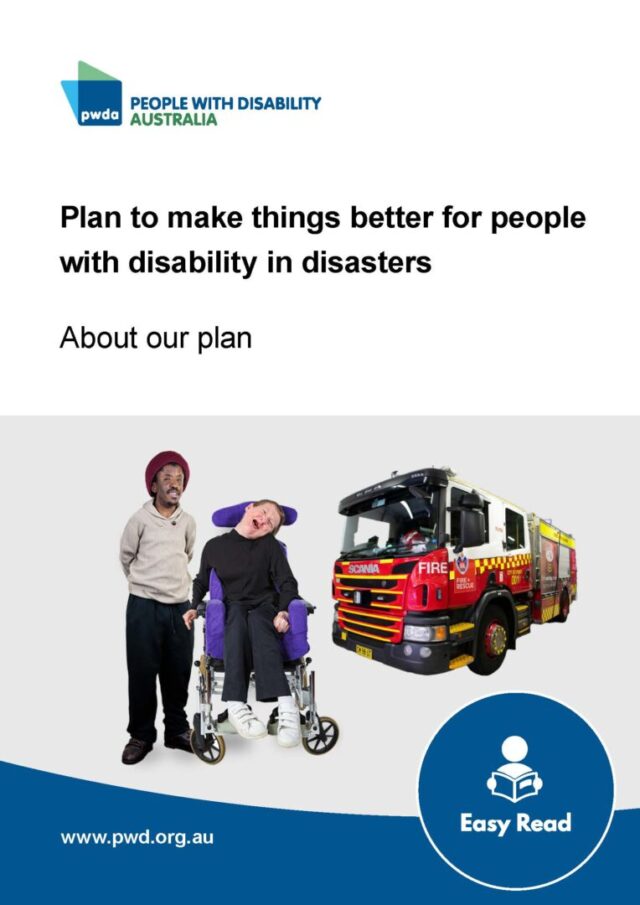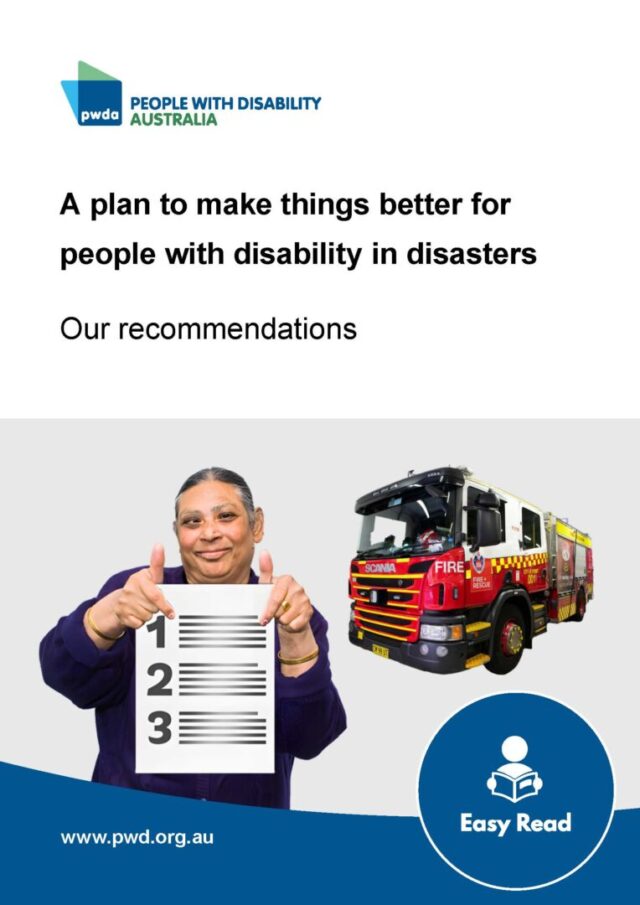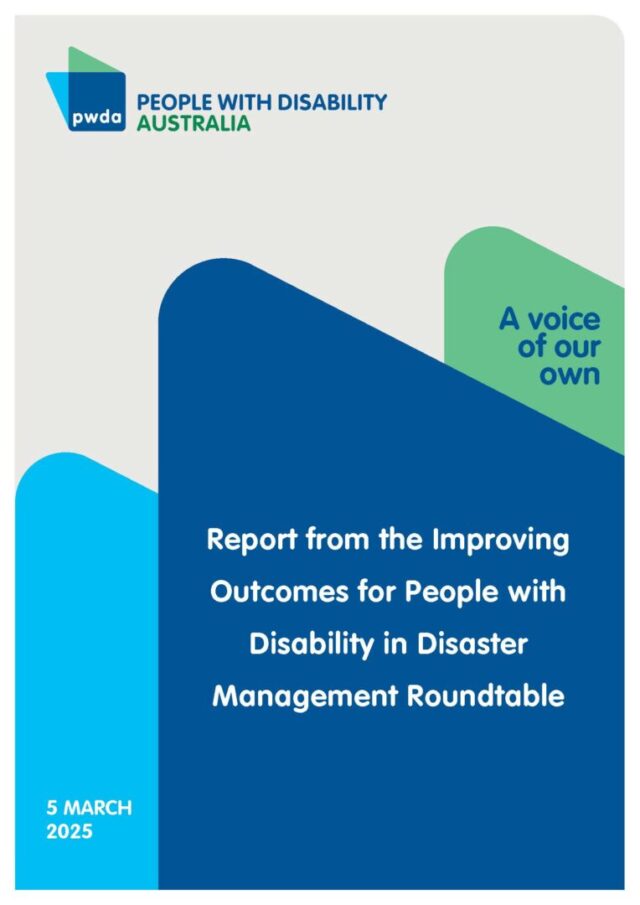
PWDA’s Roadmap for Improving Outcomes for People with Disability in Disaster Management
21 January 2025
PWDA attended the NSW State Emergency Management Committee (SEMC) Roundtable (the Roundtable) hosted by the NSW Department of Communities and Justice (DCJ) as a member of the NEMA Disability Inclusive Emergency Management (DIEM) Expert Advisory Panel (EAP) and will attend the National Emergency Management Agency’s Charitable, Not-for-Profit and Philanthropic Roundtable.
PWDA has previously undertaken research, prepared responses and called for change to disaster and emergency management and COVID-19 measures to be more inclusive of people with disability to reduce their risk before, during and after a disaster.
In its Emergency Planning and Response Issues Paper,[i] and its Statement of Concern[ii] the Disability Royal Commission expressed its concern over the impact of the COVID-19 pandemic, bushfires, floods and droughts on people with disability.
We surveyed our members who continued to reflect issues with disaster and emergency management that urgently need addressing. To discover what needs to change, we must:
- identify the plans for disasters and emergencies
- examine what currently occurs
- identify where the ‘gaps’ in planning and execution are that have occurred, and
- establish what could be changed, and how, in order to provide recommendations.
Based on the issues identified by members and through our research, PWDA has identified a range of issues, gaps, and has made recommended changes.
PWDA has developed comprehensive agenda for improving the inclusion of people with disability in emergency and disaster management planning and response at the federal, state, and local levels. Our recommendations are designed to ensure that emergency management systems are accessible, inclusive, and responsive to the needs of people with disability, in line with the Sendai Framework for Disaster Risk Reduction.
People with disability and their DROs need to be included in the development disaster and emergency management policy and plans, using a co-design process to identify existing gaps and solutions
[i] Royal Commission into Violence, Abuse, Neglect and Exploitation of People with Disability, Emergency planning and response issues papers, 15 April 2020, last accessed 5 November 2024, https://disability.royalcommission.gov.au/publications/emergency-planning-and-response
[ii] Royal Commission into Violence, Abuse, Neglect and Exploitation of People with Disability Statement of concern – The response to the COVID-19 pandemic for people with disability, 26 March 2020, last accessed 5 November 2024, https://disability.royalcommission.gov.au/publications/statement-concern-response-covid-19-pandemic-people-disability
Easy Read resources
Recommendations
Recommendation 1
PWDA recommends greater involvement of people with disability in the development of Federal disaster and emergency management plans and policy.
Recommendation 2
PWDA recommends each State work with people with disability and their DROs to develop a comprehensive evaluation of the issues and gaps for each service, and an appropriate response.
Recommendation 3
PWDA recommends a co-design process be used that is accessible, includes people with disability and their DROs, gathers lived experiences, issues, recommendations for change, and that reports outcomes and actions transparently.
Recommendation 4
PWDA recommends a co-design process for identifying the resources required, so that P-CEPs can be prepared and implemented.
Recommendation 5
PWDA recommends Federal, State and Local Governments prioritize resourcing emergency management so that it is accessible and inclusive.
Recommendation 6
PWDA recommends mandating the provision of accessible information for all government services in a Disability Rights Act.
Recommendation 7
PWDA recommends resourcing a community communications role to provide DROs and others with emergency information in a clear format, a point of contact to check accuracy with as they create resources for their stakeholders, funding to do this work including training staff in advance.
Recommendation 8
PWDA recommends improving funding flexibility for DROs who respond in emergencies.
Recommendation 9
PWDA recommends all forms of emergency communication should be reviewed and amended to provide accessible formats for everyone.
Recommendation 10
PWDA recommends that all channels and methods of communication used be reviewed to maximise access.
Recommendation 11
PWDA recommends the development of early evacuation communications planning and facility management to meet the needs of people with disability.
Recommendation 12
PWDA recommends the allocation of resources to enable government and emergency management stakeholders who complete the P-CEP Certificate Training to meet the needs and identified barriers for people with disability.
Recommendation 13
PWDA recommends the allocation of resources to enable communities to work with people with disability to identify and improve shelter accessibility issues, and access to information about them.
Recommendation 14
PWDA recommends that as part of developing the Health National Adaptation Plan healthcare providers be consulted on the types and quantities of supplies that communities will need in emergencies.
Recommendation 15
PWDA recommends that transport mapping be undertaken, and plans be developed and resourced to provide accessible transport in emergencies.
Recommendation 16
PWDA recommends that people with disability continue to be a priority cohort, and that their DROs be included in NEMA, State Emergency Management Committees (SEMCs) and Regional Emergency Management Committees (REMC) and their knowledge applied to emergency planning.
Recommendation 17
PWDA recommends that NEMA members, SEMCs and REMC members be required to complete the free eLearning Introduction to Disability Awareness course,[i] and the Emergency Sector Disability Awareness learning module[ii]
Recommendation 18
PWDA recommends that at least one member of each REMC, to further complete the Person-Centred Emergency Preparedness (P-CEP) Certificate Course with a view to assisting with representing, and advocating for, people with disability by establishing and maintaining a regional forum for ongoing consultation and communication with people with disability and representative organisations and services
Recommendation 19
PWDA recommends SEMCs commission and fund the development of an initiative, including a program evaluation to support recurrent funding, to facilitate local involvement of people with disability in disaster preparedness, based on the European Centre for Forest Fires (ECFF) work titled ‘Leave No One Behind: Active Involvement of Persons with Disabilities in Disaster Preparedness and Response towards Strengthening Inclusive Disaster Resilience[iii]’ to enable people with disability to:
- access information on their local risks and hazards and learn more about emergency management arrangements
- identify risk reduction activities that can be undertaken in their home or business.
- complete, with support if required, a risk-informed emergency plan relevant to their circumstances and location.
Recommendation 20
That NEMA and SEMCs work together with people with disability to develop roadmap to assist people with disability to identify and navigate the information, resources, tools, local hazards, plans and apps available, addressing any accessibility barriers
[i] Disability Awareness. Introduction to Disability Awareness. https://disabilityawareness.com.au/elearning/disability-awareness/
[ii] The University of Sydney, Emergency Sector Disability Awareness https://collaborating4inclusion.org/emergency-sector-disability-awareness/
[iii] European Center for Forest Fires, Leave No One Behind https://www.preventionweb.net/media/97508/download?startDownload=20240920
Easy Read Resources
Ends | Contact Us



